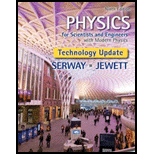
Concept explainers
(a)
The distance, the piston will move down when dog steps onto it.
(a)
Answer to Problem 76CP
The distance, the piston will move down when dog steps onto it is
Explanation of Solution
Write the equation for the distance that will move down.
Here,
Write the expression of
Here,
Write the expression for the final pressure,
Here,
Write the expression for the initial volume.
Here,
Write the expression for the final volume.
Write the expression for the equilibrium height by using (II), (III), (IV) and (V).
Write the expression for the height with the dog mass on the piston by using (II), (III), (IV) and (V).
Here,
Write the expression for the cross-sectional area.
Here,
Rewrite the expression for the distance that will move down from equation (I) by using (VI) (VII) and (VIII).
Conclusion:
Substitute
Thus, the distance, the piston will move down when dog steps onto it is
(b)
The required temperature to raise the piston.
(b)
Answer to Problem 76CP
The required temperature to raise the piston is
Explanation of Solution
Write the equation from the ideal
Here,
Rewrite the equation for the final time from equation (X) by using (IV), (V), (VI), (VII) and (VIII).
Conclusion:
Substitute,
Thus, the required temperature to raise the piston is
Want to see more full solutions like this?
Chapter 19 Solutions
Physics for Scientists and Engineers with Modern Physics, Technology Update
- How can I remember this Formula: p = m × v where m is in kg and v in Meter per second in the best way?arrow_forwardHow can I remember the Formula for the impulsearrow_forwardA Geiger-Mueller tube is a radiation detector that consists of a closed, hollow, metal cylinder (the cathode) of inner radius ra and a coaxial cylindrical wire (the anode) of radius г (see figure below) with a gas filling the space between the electrodes. Assume that the internal diameter of a Geiger-Mueller tube is 3.00 cm and that the wire along the axis has a diameter of 0.190 mm. The dielectric strength of the gas between the central wire and the cylinder is 1.15 × 106 V/m. Use the equation 2πrlE = 9in to calculate the maximum potential difference that can be applied between the wire and the cylinder before breakdown occurs in the gas. V Anode Cathodearrow_forward
- 3.77 is not the correct answer!arrow_forwardA I squar frame has sides that measure 2.45m when it is at rest. What is the area of the frame when it moves parellel to one of its diagonal with a m² speed of 0.86.c as indicated in the figure? >V.arrow_forwardAn astronent travels to a distant star with a speed of 0.44C relative to Earth. From the austronaut's point of view, the star is 420 ly from Earth. On the return trip, the astronent travels speed of 0.76c relative to Earth. What is the distance covered on the return trip, as measured by the astronant? your answer in light-years. with a Give ly.arrow_forward
- star by spaceship Sixus is about 9.00 ly from Earth. To preach the star in 15.04 (ship time), how fast must you travel? C.arrow_forwardIf light-bulb A is unscrewed, how will the brightness of bulbs B and C change, if at all? How does the current drawn by from the battery change?arrow_forwardCan someone help mearrow_forward
- Can someone help me with this thank youarrow_forward(a) For a spherical capacitor with inner radius a and outer radius b, we have the following for the capacitance. ab C = k₂(b- a) 0.0695 m 0.145 m (8.99 × 10º N · m²/c²)( [0.145 m- 0.0695 m × 10-11 F = PF IIarrow_forwardA pendulum bob A (0.5 kg) is given an initialspeed of vA = 4 m/s when the chord ishorizontal. It then hits a stationary block B (1kg) which then slides to a maximum distanced before it stops. Determine the value of d.The coefficient of static friction between theblock and the plane is μk = 0.2. The coefficientof restitution between A and B is e = 0.8.Ans: d=1.0034 marrow_forward
 Principles of Physics: A Calculus-Based TextPhysicsISBN:9781133104261Author:Raymond A. Serway, John W. JewettPublisher:Cengage Learning
Principles of Physics: A Calculus-Based TextPhysicsISBN:9781133104261Author:Raymond A. Serway, John W. JewettPublisher:Cengage Learning Physics for Scientists and Engineers: Foundations...PhysicsISBN:9781133939146Author:Katz, Debora M.Publisher:Cengage Learning
Physics for Scientists and Engineers: Foundations...PhysicsISBN:9781133939146Author:Katz, Debora M.Publisher:Cengage Learning College PhysicsPhysicsISBN:9781285737027Author:Raymond A. Serway, Chris VuillePublisher:Cengage Learning
College PhysicsPhysicsISBN:9781285737027Author:Raymond A. Serway, Chris VuillePublisher:Cengage Learning Physics for Scientists and EngineersPhysicsISBN:9781337553278Author:Raymond A. Serway, John W. JewettPublisher:Cengage Learning
Physics for Scientists and EngineersPhysicsISBN:9781337553278Author:Raymond A. Serway, John W. JewettPublisher:Cengage Learning Physics for Scientists and Engineers with Modern ...PhysicsISBN:9781337553292Author:Raymond A. Serway, John W. JewettPublisher:Cengage Learning
Physics for Scientists and Engineers with Modern ...PhysicsISBN:9781337553292Author:Raymond A. Serway, John W. JewettPublisher:Cengage Learning College PhysicsPhysicsISBN:9781305952300Author:Raymond A. Serway, Chris VuillePublisher:Cengage Learning
College PhysicsPhysicsISBN:9781305952300Author:Raymond A. Serway, Chris VuillePublisher:Cengage Learning





